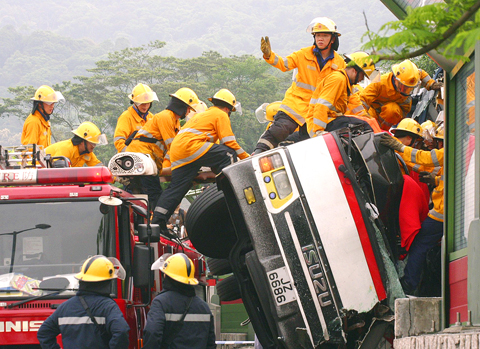An overcrowded tour bus lost control on a slope and flipped over yesterday in Hong Kong, killing 18 members of a local religious group and injuring 45 others. The driver was arrested on charges of dangerous driving.
After visiting the injured, Hong Kong Chief Executive Donald Tsang (曾蔭權) told reporters it was the city’s worst traffic accident in recent years.
A double-decker bus crash killed 21 people in 2003.

PHOTO: AP
Local TV reports from yesterday’s crash scene showed mostly elderly passengers covered in blood and wincing in pain as they were being pulled from the vehicle.
The battered bus’ windows were shattered, and it was leaning against a road barrier in the suburban district of Sai Kung.
“We’re still investigating the cause of the accident. We will look at whether it was due to speeding or whether there was anything wrong with the parts of the bus,” said Ho Chak-kan, acting police superintendent.
Ho said the driver was arrested and accused of dangerous driving that caused death. But Hong Kong Cable TV quoted the driver as saying the brakes failed before the accident.
The bus, with a maximum legal capacity of 55 people, was carrying 62 passengers on the religious group’s outing during the public May Day holiday, fire official Li Hung-sam told reporters.
Li said the roof of the bus collapsed after hitting a road barrier at a traffic circle and that hindered rescue efforts.
“Firemen had to climb inside the wreckage to save all the passengers. Inside the wreckage, all the passengers are trapped by the distorted seats,” Li said.
Most of the victims were critically injured, suffering head injuries, severe bleeding and broken bones, Li said. Most of those who died were women, he said.
The accident happened as the bus travelled from Kowloon to Hong Kong’s eastern New Territories, a seaside stretch that is heavily visited by tour groups on public holidays and weekends.

‘EYE FOR AN EYE’: Two of the men were shot by a male relative of the victims, whose families turned down the opportunity to offer them amnesty, the Supreme Court said Four men were yesterday publicly executed in Afghanistan, the Supreme Court said, the highest number of executions to be carried out in one day since the Taliban’s return to power. The executions in three separate provinces brought to 10 the number of men publicly put to death since 2021, according to an Agence France-Presse tally. Public executions were common during the Taliban’s first rule from 1996 to 2001, with most of them carried out publicly in sports stadiums. Two men were shot around six or seven times by a male relative of the victims in front of spectators in Qala-i-Naw, the center

Canadian Prime Minister Mark Carney is leaning into his banking background as his country fights a trade war with the US, but his financial ties have also made him a target for conspiracy theories. Incorporating tropes familiar to followers of the far-right QAnon movement, conspiratorial social media posts about the Liberal leader have surged ahead of the country’s April 28 election. Posts range from false claims he recited a “satanic chant” at a campaign event to artificial intelligence (AI)-generated images of him in a pool with convicted sex offender Jeffrey Epstein. “He’s the ideal person to be targeted here, for sure, due to

DISPUTE: Beijing seeks global support against Trump’s tariffs, but many governments remain hesitant to align, including India, ASEAN countries and Australia China is reaching out to other nations as the US layers on more tariffs, in what appears to be an attempt by Beijing to form a united front to compel Washington to retreat. Days into the effort, it is meeting only partial success from countries unwilling to ally with the main target of US President Donald Trump’s trade war. Facing the cratering of global markets, Trump on Wednesday backed off his tariffs on most nations for 90 days, saying countries were lining up to negotiate more favorable conditions. China has refused to seek talks, saying the US was insincere and that it

Australia’s opposition party yesterday withdrew election promises to prevent public servants from working from home and to slash more than one in five federal public-sector jobs. Opposition leader Peter Dutton announced his conservative Liberal Party had dropped its pledge that public servants would be required to work in their offices five days a week except in exceptional circumstances. “I think we made a mistake in relation to this policy,” Dutton told Nine Network television. “I think it’s important that we say that and recognize it, and our intention was to make sure that where taxpayers are working hard and their money is